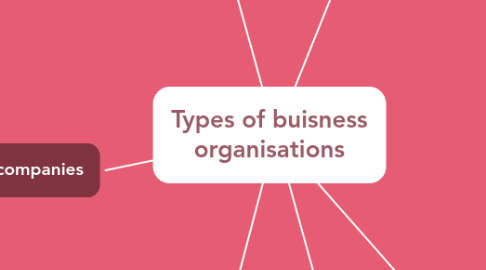
1. Sole traders
1.1. Most common form of buisness organisation
1.2. A buisness operated by one owner
1.3. Advantages
1.3.1. Few legal regulations
1.3.1.1. Owner must register and send annual accounts to the goverment office
1.3.1.2. Name of the buisness , clear specification who who owns the buisness
1.3.1.3. Obey health and safety precautions that requires license
1.3.2. Has control over buisness
1.3.3. Close contact with customers
1.3.4. Keep all profits
1.3.5. Does not need to give informations for others
1.3.6. Freedom over holidays , hours of work ,prices , and employments
1.4. Disadvantages
1.4.1. No one to discuss for buisness matters
1.4.2. No benefit for limit liability (debts )
1.4.3. Slow progress (hard to expand buisness ) (expansions restricted )
1.4.4. Unlikely to benefit economies of scale
1.4.5. No one to take control after death
2. Partnerships
2.1. Group of association with two or more people
2.2. Advantages
2.2.1. More capital could be invested into the buisness
2.2.2. More capital could be invested into the buisness
2.2.3. Shared responsibilities
2.2.4. Motivated to work hard with shared profits
2.3. Disadvantages
2.3.1. Does not have limited liability
2.3.2. No separate legal identity (if one person dies , the other legally stops )
2.3.3. Takes time during disagreements
2.3.4. Can cause lost of money cause by partner’s dishonesty
2.3.5. Limited partners <20
2.3.5.1. Limited people investing
3. Private limited companies
3.1. Incorporate buisness
3.2. Company exist after owners death
3.3. Allowed to make contracts or legal agreements
3.4. Company accounts care kept deprecate from owner
3.5. Jointly own by the peole who have invested in the buisness
3.5.1. Shareholder
3.6. Advantages
3.6.1. Shares can be sold in large numbers of people
3.6.2. Buisness can spread more rapidly and faster
3.6.3. Limited liability
3.6.3.1. (if company fails , the shareholder does not need to sell own possession ,they would lose their original investments )
3.7. Disadvantages
3.7.1. Large amount of legal matters dealt before the company is formed
3.7.2. Associations to make sure the company is ran correctly with structures
3.7.2.1. The article of asscosiation
3.7.2.1.1. how the company will be managed and the diffrent directors hand duties
3.7.2.2. The memorandum association
3.7.2.2.1. Contains important information of the official name , address , important informations of shares .
3.7.3. Cannot be sold without other shareholder’s permissions
3.7.4. Company must sent private informations to register of companies to inspect
3.7.5. Cannot offer the shares to public ,can’t rais capitals into running the buisness .
4. Public limited companies
4.1. Suitable for large buisness
4.2. Raise capital to expand nationally or internationally l
4.3. Advantages
4.3.1. Separate legal identity to owner and shareholders
4.3.2. Canaris large amounts of capitals to invest in buisness
4.3.3. Limited liability to share holders
4.3.4. No limited to amount of share holders
4.4. Disadvantages
4.4.1. Complicated legal formalities
4.4.2. Large amount of regulations and control in order to protect interest
4.4.3. Selling shares to the public is expensive
4.4.4. Danger of losing control
5. Franchise
5.1. Sells the right to use the name and idea ,to open buisness under the brand’s umbrella
5.2. Example
5.2.1. Mcdonalds
5.2.2. The Body Shop
5.3. Advantages
5.3.1. To the franchise
5.3.1.1. Percentage of buiness failure reduce
5.3.1.2. Franchiser pays for advertising
5.3.1.3. Supplies obtain from central source
5.3.1.4. Banks offer to lend because of the low risks
5.3.1.5. Fewer decisions
5.3.2. To the franchisor
5.3.2.1. Faster expansion
5.3.2.2. Management responsibility is incharged by the franchise
5.3.2.3. All products sold must be obtained from the franchisor
5.4. Disadvantages
5.4.1. To the franchise
5.4.1.1. Less independence
5.4.1.2. Unable to make decisions (less freedom )
5.4.1.3. Licence fee annually
5.4.2. To the franchisor
5.4.2.1. Poor management can lease to bad reputations for the whole buisness
5.4.2.2. Franchises keeps profits .
6. Joint ventures
6.1. Two or more buisness agree to start a new project
6.2. Advantages
6.2.1. Sharing of cost
6.2.1.1. Might be expensive for new project
6.2.2. Shared risk
6.2.3. Local knowledge is well known in the country
6.3. Disadvantages
6.3.1. If new project is successful , you would have to share the profits
6.3.2. Might have a lot of disagreements
6.3.3. Diffrent ways and culture of running buisness
